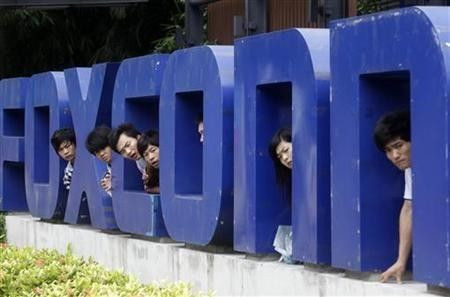Foxconn to Replace Employees with 1 Million Robots

Taiwan-based technology giant Foxconn, which manufactures electronics and computer components on a contractual basis for leading computer and phone companies such as Apple Inc., Dell, Sony Corp. Hewlett-Packard and Nokia, has announced that it would be replacing its workers with 1 million robots in the coming three years.
"The move aims at cutting the rising labor expenses and improve efficiency," said Terry Gou, founder and chairman of the company, late on Friday, reported Xinhua news agency.
Simple tasks that are currently done by human workers, such as welding and assembling parts will be assigned to the robots, said Gou at a workers' dance party Friday night. Currently, the company has 10,000 robots and the number is expected to jump to 300,000 in the next year and up to 1 million in the next three years.
Foxconn, has been in the spotlight since a number of its workers committed suicide, which prompted HP, Apple, Sony and other companies to launch an investigation into Foxconn's business practices. The suicides are blamed on stressful working conditions.
So are the replacement of workers with robots a step to avoid future suicides?
The company currently employs 1.2 million people, with about 1 million of them based on the Chinese mainland, said the report.
On May 20, an explosion in Foxconn's Chengdu plant in China left two people dead and 16 injured.
Foxconn's move to replace its 'human' employees with robots could be just the beginning of turning the industry into completely robot-employed. After all, its workers have been repeatedly pushed to the extent of committing suicides, not being able to withstand the work pressure and environment.
New York-based worker's rights group China Labor Watch had last year alleged that Foxconn enforces "military-style administration and harsh working conditions," making its workers, most of whom are in their early 20s with little or no social support, labor for up to 12 hours at a stretch on highly-repetitive, assembly-line tasks without any break and sometimes the workers are forced to work even on weekends. The workers, the group said, have often complained to them that they are "extremely tired, with tremendous pressure." Li Qiang, the group's executive director, said Foxconn "tramples" workers' personal values for the sake of efficiency.
According to labor group Students and Scholars Against Corporate Misbehavior, Foxconn is notorious for enforcing harsh, military-style work culture to maximize output. "From our recent research outside a Foxconn's facility in Shenzhen, most of the workers agree that they feel stress in the production lines," the labor group had said. "They are not allowed to talk to each other when working. Even in the same production line, workers do not have chance to get to know their colleagues."
Apple, Dell and HP spokesmen in the past expressed their shock by the "tragic events" and Apple and HP have set out guidelines on work conditions to their suppliers and if violated, terminate contracts with them.
However, some analysts feel that Foxconn's clients, though distraught, have little option but to keep the relationship going.
"They can't be happy about it," said Andy Hargreaves, an analyst at Pacific Crest Securities. "They promote themselves as far as being forward thinking in terms of conscience - and this (suicides) is damaging to their reputation along those lines."
But Hargreaves said companies like Apple, Dell, HP or Sony have little choice because there are very few manufacturing companies like Foxconn that are capable of producing electronic products or computer components at a rate required to satisfy demand. Giving an example, Hargreaves said Apple sold 8.75 million iPhones in the last quarter alone and "if you want to build a lot of handsets and you want them to be competitively priced, you don't have a lot of options."
Some analysts also claim that the suicides at Foxconn facilities underscore China's growing labor problem.
© Copyright IBTimes 2025. All rights reserved.





















